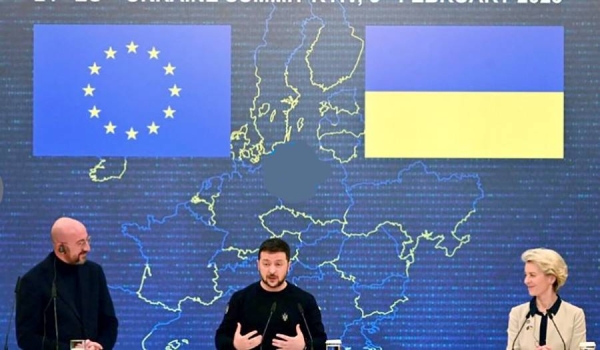
In one sense Andriy Pavelko feels prepared for the moment Shakhtar Donetsk and Metalist 1925 kick off a new football season on Tuesday. “When our national team played against Scotland in June I cried as soon as the anthem started playing, I just couldn’t believe it,” says the Ukrainian FA president. “And it’s going to be the same this time. Football will be the breath of fresh air that reminds people what we are fighting and dying for.”
Only last Wednesday did Pavelko feel certain the sport would return on the date, one day before the celebration of Ukrainian independence, he had earmarked. That was when the security protocols were finally signed off after exhaustive conversations that were not always plain sailing. Should fans be allowed in? That question was easy enough to answer during wartime. Ought the precise time and location of games be kept secret? That was up for discussion but ultimately rejected. What will happen if and when air raid sirens interrupt play? Nobody can be entirely sure how that will feel but games may be abandoned if they sound for longer than an hour. Referees will confer with military advisers to make that decision.
The list of considerations is sprawling. This is new, barely precedented territory and tweaks are expected along the way. “It’s been a great challenge in my life,” says Pavelko, speaking animatedly at the FA’s headquarters. Work there never really stopped: as soon as Russia invaded there were round‑the‑clock efforts to evacuate teams, players, referees and coaches; efforts to help on the humanitarian front quickly followed and then came the issue of getting back under way.
Top-flight clubs were unanimous in giving it a go but two meetings with Volodymyr Zelenskiy in late May were pivotal in garnering political will. “I raised the question and heard a firm ‘Yes’,” he says. “They were conversations about what our society needs right now. It needs a strong signal. The president was prepared to give us everything we needed to let the world know Ukraine is a strong country and that we are confident in our victory.”
Pavelko spends the next half‑hour offering a whirlwind precis of the visits – he has travelled to every region of Ukraine at least twice since February – and personal stories that convinced him football was fundamental to the country’s resistance and recovery. He lands upon one in particular that made the job required of him crystal clear. At a hospital in Zaporizhzhia, the city that received thousands of evacuees from Mariupol, he met a boy who had sustained 18 bone fractures along with shrapnel wounds to the head and chest.
The 12-year-old’s blood pressure had dropped to the extent he was barely alive on arrival and his survival is yet another tale of the local medics’ heroic work amid impossible conditions. Pavelko ascertained that he had been playing football shortly before his evacuation and that his favourite player was Oleksandr Zinchenko. He dialled Ukraine’s vice-captain immediately and the boy, unable to move and welling up with tears, took a video call with his idol. “He was a hair’s width from death, much like the rest of Ukraine,” Pavelko says. Happily, his treatment has continued in Germany and he is learning to walk again.
These tales of kinship, bravery and, at times, tragedy could fill numerous books and Pavelko says he would willingly write one when Ukraine has eventually prevailed. People such as the boy in Mariupol unwittingly delivered the message he had been seeking to articulate: that, far from being mere frippery in times of unimaginable horror, football has its place.
For the opener that will be Kyiv’s Olympiyskiy stadium, which hosted the Euro 2012 final and 2018 Champions League final. On a week when Zelenskiy has been among those warning of potential Russian attacks around independence day, there will inevitably be breaths held. Those attending will have to guarantee that, if instructed, they will relocate to the ground’s air raid shelter. It will be surreal and perhaps discomfiting but Pavelko makes no apologies.
“We are a brave nation,” he says. “This is an important step to raise morale of both the civilian and military personnel: to remind them they have a future. I met with our referees recently and gave them a simple message: that every participant in this will inscribe themselves into the history of world football. It’s a monumental achievement that they will be able to share with their grandchildren, and the grandkids will brag about it to their peers.”
It is also a fair achievement that the 16-strong top flight has lost only FC Mariupol and Desna Chernihiv, both of whose operations are on hold. But the postponement of FC Lviv’s opener against Minaj, amid suggestions they will struggle to fulfil fixtures, indicates the quest to keep Ukrainian football on the rails is not yet won. Further down the leagues it is a bleaker story: at least two dozen teams have been forced to suspend their activities or dissolve. The second tier recommences on Saturday but, beneath those at the top, uncertainty still prevails.
The hope is, though, that Tuesday will send a ripple of optimism through the entire country. Pavelko draws parallels with the famous “death match” that was played when Ukraine was under occupation by Germany in 1942 – although it is believed in some quarters to have been mythologised – with one key difference. “Our tournament is a story not of death but of life.”












